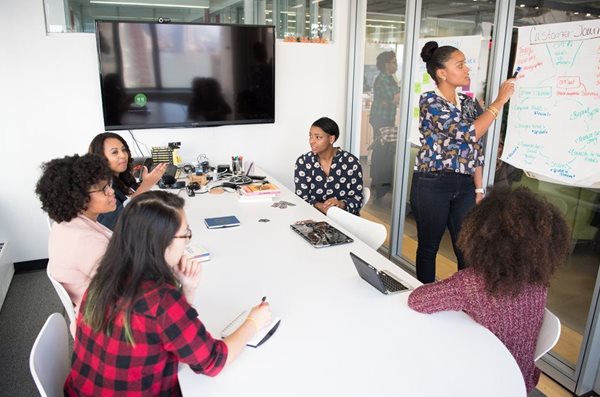Wits University's Tshimologong Digital Innovation Precinct kicks off its inaugural Ya Basadi in 4IR programme, with the financial support of J.P. Morgan. Ya Basadi, meaning 'for women' in Setswana, is an acceleration programme that will enable Tshimologong to support established small businesses in transitioning into both technology and/or technology-enabled companies with the purpose of optimising their operations quickly and efficiently.

Photo by Christina Morillo© from
PexelsThe programme is targeting primarily women-owned businesses, which are already trading and have a clear understanding of how tech can scale their businesses. Ya Basadi will also include underserved female entrepreneurs from low income backgrounds.
Khwezi Fudu Cenenda, Enterprise Development Manager at Tshimologong says the Ya Basadi programme taking place this month is well timed as the country dedicates the month of August to saluting women: “Entrepreneurship is fast becoming a chosen way to counteract the low economic growth and increasing unemployment. This is particularly prevalent when looking at the Small Enterprise Development Agency (SEDA) research, which notes that 72% of micro-enterprises and 40% of small enterprises are currently owned by women. Unfortunately, these businesses often require funding as well as support in terms of digital transformation.”
Use of technology
Of significance is the imminent rise of the Fourth Industrial revolution (4IR) and how this can be transitioned into each business. Developed with three main components: technology training, experiential learning through immersions in industry and the development of a Minimum Viable Product (MVP), the programme will enable participants to understand how to apply and adopt new technology into their business such as, amongst others, Machine Learning (ML), data analytics, robotics and Internet of Things (IoT), that can lead to growth with smarter data-analysis, rapid prototyping and understanding of adaptive manufacturing principles. The ultimate goal of the programme is to help women-owned businesses scale, generate more value and create employment in Johannesburg economies.
Senior Country Officer for J.P. Morgan, Kevin Latter, said: “We are excited to support this innovative programme at a time in our country where small business growth is crucial. As a firm, J.P. Morgan globally focuses on supporting small business and the empowerment of women. This programme therefore fits perfectly with our global ethos. The devastating impact of Covid-19 in South Africa has made it even more important for the business sector to support the development of smaller businesses and job creation.”
In addition, Cenenda says that the programme will also focus on 4IR because of the opportunities that it presents for women’s businesses and how this evolution could assist them to flourish beyond micro and small business status: “Only 13% of women graduate in STEM (Science, Technology, Engineering, and Mathematics) while only 23% hold IT jobs. This means that the potential for women to participate in 4IR is limited. Our objective with the programme is to innovate and collaborate to find new ways of increasing access for women in technology.”
Ready to go
With a selected cohort ready to go, she says that the entrepreneurs will be challenged to develop or build a Minimum Viable Product (MVP) that will be presented at the end of the programme. A cross section of some of the solutions that the cohort brings, includes the provision of a travelling nurse using an online booking system; automated recycling; the provision of WIFI to households in townships; offering assessments and career guidance purely through automated calendar bookings and video calls and using financial tools to protect Africa’s green assets.
“The key to success will be to support women-led businesses to transition to becoming tech or tech-enabled companies and to help them move to the next level as a business. Those companies that are already classified as tech businesses will get the opportunity to deepen their use of tech. This pipeline will need to be nurtured, developed and grown, which is why we are looking to secure additional partnerships to assist in developing the programme moving forward,” says Cenenda.
The year-long Ya Basadi programme will comprise of technology masterclasses in 11 areas of technology such as App and Web Development, 3D Printing, AI, Robotics, IoT, VR and Cybersecurity. In addition to this, the entrepreneurs will get practical, on the job experience in industry; learning circles for the cohort to share experiences; and will conclude with at least a MVP being developed for or by each start-up.
Facebook’s Sheryl Sandberg once said, “No industry or country can reach its full potential until women reach their full potential. This is especially true of science and technology, where women with a surplus of talent still face a deficit of opportunity.”
For more, go to https://tshimologong.joburg/yabasadi/




































